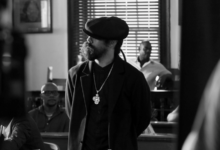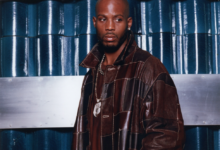UB Full [access]: Madea’s Witness Protection

UB Full [access]: Madea’s Witness Protection!
Having already appeared in six of Perry’s films, including his breakout 2005 hit, Diary of Mad Black Woman, the gun-toting, no-nonsense Madea has long been a fixture in the Tyler Perry universe and one of the cornerstones of his ever-growing popularity. The character has appeared both as star and as supporting player, as unhinged comic relief and as wise, inspirational matriarch. Through all this, Madea’s stories have remained within the bounds of her extended Southern family. So this time around, Perry was eager to break new ground. “I knew I wanted to have a fish-out-of-water story,” he explains. “I wanted to put her in a whole new situation. So I thought, What about a witness protection situation where an entire family has to move in with her, a family like she’s never seen before?”
With this comic premise, Perry quickly found his story. Hoping to make some easy extra cash, Madea agrees to let her FBI agent nephew, Brian (also played by Perry), place a family from the witness protection program in her home. The last thing she expects, however, is a wealthy, dysfunctional white family from Connecticut – the Needlemans – upending her quiet life with Uncle Joe, her randy octogenarian brother (also played by Perry).
“We all had so much fun on this movie poking fun at the differences between us as people while at the same time being respectful,” says Perry. “The characters clash over everything. The way the Needlemans raise children; the way Madea raises children. What she cooks; what they eat. There was potential for comedy everywhere.”
“There’s a breadth to this story that’s very rich,” adds Eugene Levy, who stars as George Needleman. “We have two very different families that end up interacting, so the story is able to explore a lot of ideas through the comedy.”
“To me, Madea’s Witness Protection is hands down the funniest movie I’ve ever made,” says Tyler Perry, the writer, director and multi-character star of thelatest Madea comedy. “This is an out-and-out comedy. There’s no drama in it. It’s straight-up laughs all the way through. And I was just so lucky to have this incredible cast of comedians like Eugene Levy and Doris Roberts, John Amos and Marla Gibbs. They’re all just hysterical.”
As the comic sparks fly between the two families, Madea comes to realize that the Needlemans, as privileged as they might be, are a barely functioning family. George Needleman, a quiet, dutiful banker who finds himself framed for a mob-backed Ponzi scheme, has managed to recede completely from his family life. His second wife, Kate (Denise Richards), is at her wit’s end taking care of his live-in mother, Barbara (Doris Roberts), who openly states her preference for George’s first wife. George’s daughter, Cindy (Danielle Campbell), is spoiled beyond hope and makes Kate the object of her anger. And George’s young son, Howie (Devan Leos), barely has a relationship with his absent father. “It’s a family that’s not quite hanging in together,” says Levy.
Madea changes that, administering her unique brand of tough love as an antidote to the Needlemans’ many dysfunctions. “George isn’t a strong disciplinarian,” explains Levy. “But Madea speaks her mind. There’s no BS going on with this character. It’s just black and white, straight ahead. She says what she thinks.”
“She’s fearless,” adds Doris Roberts, who plays George’s mother, Barbara. “She doesn’t care who she hurts or makes unhappy. And she’s tall enough and big enough that you don’t want to cross her. And most of the time, she’s telling you the truth and teaching you a lesson.”
Madea’s small world, in turn, expands in unexpected ways with the arrival of the Needlemans. “There was so much more of Madea’s character to explore just by putting her in this new scenario,” reveals Perry. “It made everything new.” One hilarious example is the film’s climax, in which Madea is forced to impersonate a fictitious socialite named Precious Jackson in order to recover the stolen investments. “She has to go up to New York to help get this money back,” says Perry, “and she has to deal with banks and airplanes and things she’s never dealt with before. Suddenly her world opens up really wide, and that’s where the comedy is.”
Widely admired for his roles in popular comedies like American Pie and Bringing Down The House, actor Eugene Levy says he was interested in playing George Needleman because the part appeared to be the “straight” role. “I thought, Well, that’s a challenge,” he says. “I don’t really get this kind of role too often and I understand that Madea’s the comic force.” But when Levy arrived on set, the dynamics of the script began to change. “We had this straight scene and Tyler said, ‘Well, let’s just blow a hole in this right here and why don’t you just go off on a little run?’ And that’s how it started.”
Levy, whose improv comedy roots go back to the famed Chicago comedy club, Second City, was encouraged by Perry to flex his improv muscles, much as he did in Christopher Guest’s cult films like Waiting for Guffman. He proved to be the ideal match for Perry, who frequently goes off the cuff as Madea. “It’s the most fun I’ve ever had with another actor. It was like a dance between us,” reports Perry. “He’s so in the moment, I had a hard time keeping a straight face. He’s one of the most underrated geniuses of comedy. And he’s the easiest person to work with. He loves the process, and he’s as funny off-screen and he is on.”
Doris Roberts, known to most audiences as Marie Barone in the long-running television series, “Everybody Loves Raymond,” enjoyed creating another opinionated matriarch with Barbara Needleman. “Barbara is outrageous,” she says. “She doesn’t pull punches. She just lays it out there, gets into everybody’s life and tells them what to do and how to do it.”
While she appears to be senile and requires the constant attention of Kate, whom she openly dislikes, Barbara sometimes seems far shrewder than she lets on. Roberts smiles, “Barbara has a big secret that she keeps that’s a big reveal in the movie but I’m not going to tell you what it is.”
“Doris Roberts might have the all-time best comic timing of any actress I know,” says Perry. “It’s amazing that at her age she’s as sharp as ever and challenging everyone else to keep up. She can totally undo you with just one look. She’s the real Madea. That’s really the best word to describe her.”
Actress Denise Richards relished the opportunity to perform in a comedy, even if her character, Kate, initially finds herself in an unpleasant, and seemingly unwinnable, family conflict. “My mother-in-law lives with us and she’s not nice to me at all,” explains the actress. “There’s a lot of tension between me and my stepdaughter. She’s really rude to me. I think it’s what happens to a lot of families when the husband’s working so much and the family is no longer a unit.”
With the encouragement of Madea, however, Kate eventually learns to stand up for herself. “There’s one scene,” Perry says, “where Madea gives Kate some advice on how to handle a situation. And to watch Denise imitate Madea, to watch her do her best Madea impression so she can bring her family in line, that’s worth the price of admission.”
Rounding out the Needleman family are the young actors Danielle Campbell and Devan Leos in the roles of Cindy and Howie, respectively. Campbell’s sunny, generous disposition is the very opposite of Cindy, an embittered teen who lashes out at her family at every opportunity. “She’s rebellious and she doesn’t know where she fits in, really,” explains Campbell. “She’s taking out all of her insecurities on her family, especially Kate, her stepmom, and her half-brother, Howie.”
“I love having younger actors on set interacting with the older generations,” says Perry. “Danielle and Devan fit right in. It was seamless. And they both delivered fantastic performances.”
During his time in Madea’s house, George Needleman learns that the Ponzi scheme stole investments from a number of charities, including Madea’s church. Pastor Nelson’s son, Jake (played in the film by the young rap star, Romeo Miller), is the one responsible for investing, and subsequently losing, the church’s money in George’s nefarious company. “Jake is just a troubled kid who’s trying to turn his wrong into a right,” explains Miller. “He thought he was doing the right thing by investing his father’s money, and now’s he resorting to robbing people like Madea to try to pay it all back.”
The son of rapper Master P, Miller began his career as a rapper at the age of thirteen with the certified platinum-selling debut album, Lil’ Romeo. Miller grew up with a constant awareness of Perry and his films, particularly because Perry, like Miller, was born and raised in New Orleans and even attended high school with Miller’s mother. “Working with Tyler Perry is a dream come true for me,” says Miller. “He reminds me of my dad. Both of them came from nothing. My dad did it in the music industry and Tyler’s doing it in the film industry and taking it to a whole other level. He’s got a great heart and there’s nobody better to work with.”
“Romeo’s just a naturally gifted actor,” Perry says. “He’s got a natural intuition about lines and a wonderful presence. His comedic skills are great. I was really impressed with him.”
For a couple of featured supporting roles, Perry approached two well-respected television veterans who he credits as paving the way for African-American actors of his generation: John Amos, known to audiences for his work on “The Mary Tyler Moore Show” and “Good Times,” and Marla Gibbs, best known for playing the sarcastic maid, Florence, on “The Jeffersons.”
“It was very important to me to have John Amos and Marla Gibbs in this movie,” says Perry. “I grew up watching them. And to have these iconic actors still around and have an opportunity to work them, to collaborate with them, that means the world to me.”
Amos lends his imposing figure to Pastor Nelson, the leader of Madea’s church who is preparing to retire. “Nelson’s so proud to be able to introduce his son, Jake, as the one who will handle the church business in the future,” says Amos. “He’s so pleased that the church has been paid off and he has no idea that his entire legacy is actually in jeopardy.”
Marla Gibbs brings her deft comic timing to the role of Hattie, Madea’s nosy neighbor who is obsessed with uncovering the true identity of Madea’s “albino cousins.” “Hattie keeps a constant eye on the strange white people going in and out of Madea’s house,” explains Gibbs.
Completing the principal cast in a crucial cameo as George Needleman’s boss is another comedy stalwart, Tom Arnold. “I play a younger, more handsome, Bernie Madoff-type guy who’s running a Ponzi scheme at his company. But he’s more honest than Bernie,” offers Arnold with a smile. “You know, when he’s busted, he’s busted. And he’s already got the guy to lay it on, which is George, his CFO.”
“Tom is great at improv, just like Eugene, so I just had him keep doing takes over and over,” recalls Perry. “It was beyond hysterical. He’s a funny, funny man, from the time it starts till it ends.”
Last but certainly not least are three more starring characters in Madea’s Witness Protection – Madea, Uncle Joe and Brian – all of whom are played by Perry himself. Perry is no stranger to the odd experience of directing in full Madea regalia and then hopping in front of the camera to shoot a take. But he shrugs off the accomplishment of playing three starring roles in a film he also happens to be directing. “I just play the different parts one at a time. That’s all I’m doing,” he says. “The most challenging part of doing it this way is getting the other actors to see you as the character and not as the director. That’s probably the most difficult thing. But otherwise I’m used to it. It comes pretty easily.”
“I’m in awe of every moment I’m with him,” admits Roberts. “He’s playing these different parts with different voices, different costumes, different hair. And they’re all brilliant. And the fact that he’s also directing at the same time is just unbelievable.”
“He’s such a great performer you wonder, is he going to be laid back as a director?” asks Denise Richards. “But he stands there and he’s saying, ‘Try this, try this, try this.’ He’s helping you out while he’s acting and at the same time he’s also editing the scene in his mind and figuring out what he needs next.”
Perry reveals that his written script is often only a template for what might happen during a shoot, and this flexibility is a vital part of his creative process. “When I have the script I think, This’ll be great if I can see this on screen. But I’m very much open to whatever happens in the moment. Let’s let it happen,” he says. “So a lot of times, I’ll shoot the master and just see where it goes. And when we go into coverage, I’ll try to pull some of those golden nuggets out of that.”
“He wants you to come up with your own ideas and act as a springboard for him to take it even another step further,” says Levy. “Personally, I love having that flexibility.”
Adds Roberts, “I’ve been working for over fifty years. I don’t ever remember freedom like this as an actor. Ever.”
Levy recalls shooting one scene in particular, in which George Needleman goes to church to tell Jake that he’s found the stolen money, that evolved from straightforward exposition into an unexpectedly comic set piece. “Tyler said, ‘Why don’t you try it like you’re getting caught up in the emotion of this revival thing here in the church?’” recounts Levy. “So it went from, you know, ‘I know where the money is,’ to ‘Ah KNOW, AH KNOW where the money is! Do YOU know? AH KNOW.’ And on and on like that. We had so much fun. There are least a dozen scenes like that, where they read very, very straight and all of a sudden, you’re going off on some kind of comedic rollercoaster ride, which is pretty exciting.”
Amazingly, for all of the experimentation that he encouraged from his cast, Perry also managed to complete production efficiently at Tyler Perry Studios and in locations in and around Atlanta (with two additional days of second unit production in New York City).
While Madea’s Witness Protection focuses on delivering laughs, the film still adheres to Perry’s goal of offering some kind of spiritual or moral lesson to his audience. “In the end,” says Richards, “the film is about realizing what’s really important in your life. Our family is really humbled. We had all this money but we didn’t have a family. And we realize we don’t need all that to be together.”
“It’s about second chances,” offers Romeo Miller. “We all make mistakes. But when you get that second chance, the important thing is what you’re going to do with it. How are you going to make things right?”
Adds Roberts, “I think this film shows people, regardless of color, or class, or background, struggling and working things out. And ultimately it’s about helping each other, caring and performing good deeds of love, good deeds of thoughtfulness.”
While Perry echoes all of these sentiments wholeheartedly, he also admits his real hope for Madea’s Witness Protection is that audiences just laugh. A lot. “I want to see the joy,” he says simply. “I want the roar of the laughter. That is what’s really important to me with this film. Having people come into the theater one way and leave much lighter. If I can do that, then I’ve done my job.”







UB Full [access]: Madea’s Witness Protection – Also LIVE Red Carpet Premiere TONIGHT http://bit.ly/Oi4kWW
Loved Eugene Levy and Doris Roberts. They were perfect choices. Would have liked to have seen more of Marla Gibbs and Tom Arnold.
And Joe was a mess…sooo funny :)